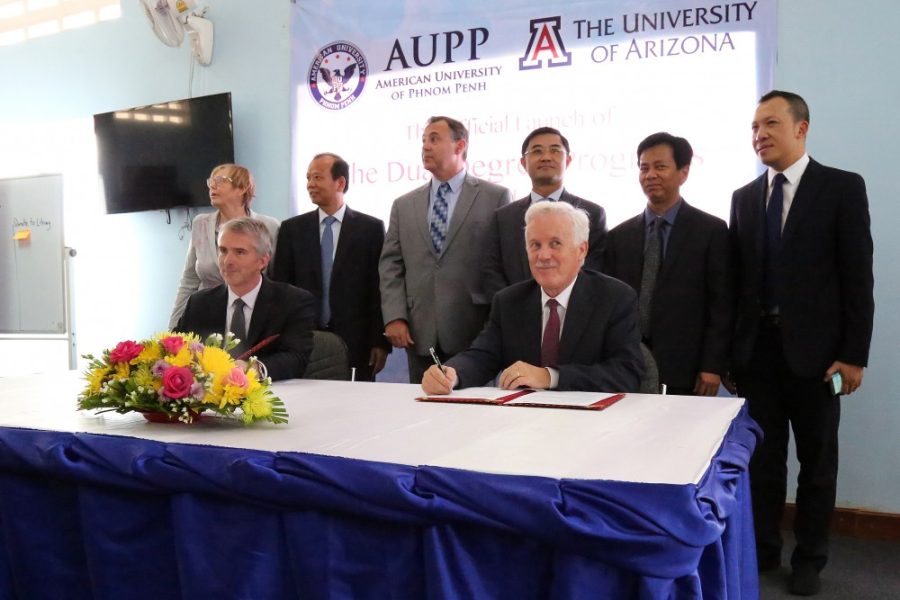The University of Arizona is expanding the micro-campus program to multiple regions throughout the world in order to provide an education to students from a multitude of backgrounds.
It all began at Ocean University of China in 2015. This was the first micro-campus partnership with the UA and it currently offers a Bachelor of Arts in Law from the UA and a Bachelor’s of Law from Ocean University.
“We plan to launch 20 micro-campus locations by 2025, creating opportunities for students around the world to earn UA degrees,” said Cristina Castañeda, senior director of global locations at UA Global in an email. “At the same time, these locations create affordable and seamless study abroad options for students in Arizona.”
Current locations in the micro-campus program include:
-UA Ajman at Gulf Medical University, United Arab Emirates
-UA Amman at Princess Sumaya University for Technology, Jordan
-UA Jakarta in Collaboration with Sampoerna University, Indonesia
-UA Phnom Penh at American University of Phnom Penh, Cambodia
-UA Qingdao at Ocean University of China, Qingdao, China
Upcoming locations for micro-campuses include:
-UA Hanoi Law at Hanoi Law University, Vietnam
-UA Lima at La Universidad Peruana de Ciencias, Peru
-UA Manila at De La Salle University, Philippines
-UA Mauritius at University, Reduit, Mauritius
-UA Sulaimani at the American University of Iraq, Iraq
RELATED: UA to Moscow; two new study-abroad options for students
According to Brent White, vice provost for Global Affairs, UA Global is also looking into the possibility of expanding to Australia, Spain, South America and Northern and sub-Saharan Africa.
When determining locations, a variety of factors aid that decision.
“We consider student demand and the availability of suitable partner institutions in the area,” said Lisa Turker, director of Arizona Abroad Locations via email. “We consult with faculty who are regional experts to determine potential partner institutions. UA Global then assesses each potential partner to ensure that it is the right fit for the UA.”
A common goal for UA Global is to provide a U.S. education to international students who are not able to travel to the U.S. to obtain a degree.
“The fundamental goal here is to provide access to an international education to students who otherwise would not have access,” White said.
The prices of micro-campuses include UA tuition plus living costs, which in a place like Phomn Penh, for example, are much lower than Tucson. This makes micro-campuses an affordable option that is not only aimed toward wealthier students, both domestic and international, but makes room for anyone looking to earn a U.S. education.
RELATED: UA Study Abroad Fair aims to broaden students’ horizons
“The micro-campus model is financially self-sustaining and revenue positive, funded by the tuition paid by students at micro-campuses,” Castañeda said.
White also elaborated on the model and discussed how the use of technological learning has impacted the program. Students can watch lectures online and then collaborate in the classroom, which drastically reduces cost while simultaneously generating revenue that circles back to the UA.
Students at the UA looking to travel abroad can do so through the micro-campus program while also staying on track for a four-year degree.
With competition from already established worldwide universities, as White said, UA is putting its foot through the door of global education.
“Our vision is that soon, as the network grows and we expand programs, that a student will be able to earn one UA degree in four different locations in four years,” White said.
Follow Mikayla Kaber on Twitter









